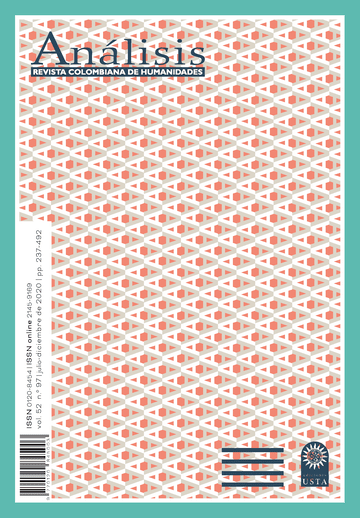Nexo ético-político del concepto de Justicia en Aristóteles. Una propuesta en la virtud para el bienestar social
The Ethical-political Relation of the Concept of Justice in Aristotle. A Proposal in Virtue for Social Welfare
Abstract (en)
To reflect on the political thought of classical Greece is to return to the ethical meanings uttered by philosophers of that time, such as Plato and his disciple Aristotle, whose interests in the rational understanding of human behavior were nothing more than a diaphanous concern for the attainment of well-being of individuals within Greek cities, where the formation of ideas, institutions, and associations was considered of great importance. In fact, the social bonds and the configuration of attitudes that favor the objective of social welfare imply a reciprocal attention to the concepts of ethics and politics, whereas the incorporation of actions governed by the reason determines the relations between individuals of the same nation. Thus, this article presents the Aristotelian meaning of justice, to clarify the importance of this virtue in the ethical-political nexus of classical Greece, a period witnessed by Aristotle himself.
Abstract (es)
Adentrarse en el pensamiento político de la Grecia clásica es retornar a las acepciones éticas proferidas por los filósofos de ese momento, como, en este caso, de Platón y de su discípulo Aristóteles, cuyos intereses por la comprensión racional de la conducta humana no eran más que una diáfana preocupación por la consecución del bienestar de los individuos al interior de las ciudades griegas, donde se consideraba de gran importancia la formación de ideas, instituciones y asociaciones. En efecto, los vínculos sociales y la configuración de actitudes que decantan en el objetivo del bienestar social implican una atención especial al concepto de ética-política, en tanto que la incorporación de acciones regidas por la razón determina las relaciones entre los individuos de una misma nación. Teniendo esto en cuenta, en el presente artículo se expone la acepción aristotélica de justicia, con el objetivo de precisar la importancia de dicha virtud en el nexo ético-político de la Grecia clásica, periodo al que asistió el mismo Aristóteles.
References
Aristóteles. (1970). Ética a Nicómaco (Edición de J. Marías y M. Araújo). Madrid: Centro de Estudios Políticos y Constitucionales.
Cassin, B. (2008). El Efecto Sofístico (Trad.: H. Pons, 1. ª Ed.). Buenos Aires: Fondo de Cultura Económica.
Demóstenes. (1980). Discursos Políticos I (Introducción, traducción y notas de A. López Eire). Madrid: Editorial Gredos.
Diógenes Laercio. (2007). Vida y Opiniones de los Filósofos Ilustres (Edición de C. García Gual). Madrid: Alianza Editorial.
García Valdéz, M. (1988). Tratado de la Política de Aristóteles (1. ª Ed.). Madrid: Editorial Clásica Gredos.
Guthrie, W. (1993). Historia de la Filosofía Griega. Introducción a la Filosofía Aristotélica (1. ª Ed.). Madrid: Editorial Gredos.
Jenofonte. (1994). Helénicas (Traducción y notas de O. Guntiñas). Madrid: Editorial Clásica Gredos.
MacIntyre, A. (2001). Tras la Virtud (Trad.: A. Valcárcel y Bernaldo, 1. ª Ed.). Barcelona: Editorial Crítica.
Plutarco. (2007). Vidas Paralelas VI (Edición de J. Bergua, S. Bueno y J. M. Guzmán). Madrid: Editorial Gredos.
Platón. (1988). Diálogos IV. República (Introducción y traducción por C. Eggers Lan). Madrid: Editorial Gredos.
Tucídides. (1990). Historia de la Guerra del Peloponeso. Libros I-II. (Trad.: J. J. Torres). Madrid: Editorial Gredos.
Verneaux, R. (1982). Textos de los Grandes Filósofos de la Antigüedad (5. ª Ed.). Barcelona: Editorial Herder.
Zavadivker, N. (2003). Trasímaco y el Derecho del más Fuerte. En La Acción y los Valores (pp. 180-187). Buenos Aires: Asociación Argentina de Investigaciones Éticas.
How to Cite
License
Authors who publish with this journal agree to the following terms:
Authors retain copyright and grant the journal right of first publication with the work simultaneously licensed under a Creative Commons Attribution License that allows others to share the work with an acknowledgement of the work's authorship and initial publication in this journal.
Authors are able to enter into separate, additional contractual arrangements for the non-exclusive distribution of the journal's published version of the work (e.g., post it to an institutional repository or publish it in a book), with an acknowledgement of its initial publication in this journal.
Authors are permitted and encouraged to post their work online (e.g., in institutional repositories or on their website) prior to and during the submission process, as it can lead to productive exchanges, as well as earlier and greater citation of published work (See The Effect of Open Access).






